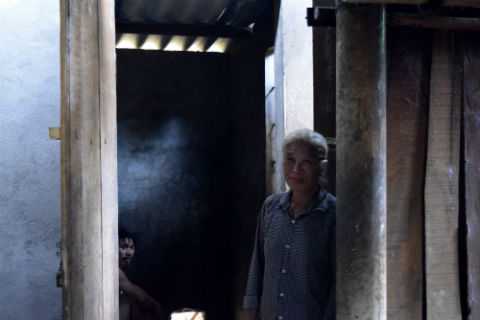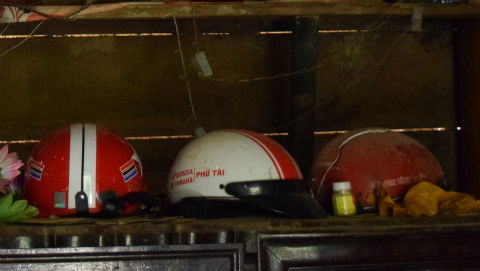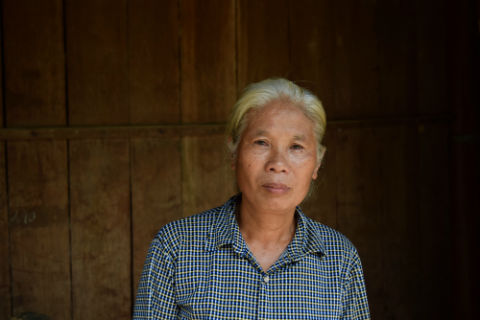
As I started out my second day in the field, I must confess I was getting quite wrapped up in the logistical details of figuring out how and when I must get the business plan completed for each family. You see, I love checklists and crossing things off. So naturally, my mind was fully racing at the moment, going over all the questions I needed to ask and answers I might get. Would I be able to get their needs assessed without the company of the outreach workers? And the dialect, how much of it would I understand today before having to ask Ngoc, AEPD staff and my trusty “Central Viet to Southern Viet” translator?
It wasn’t until we got to see Mai Thi Loi and her family that my perspective on the day completely changed. As our driver, Ngoc and I made our way to Tuyen Hoa District, I’m again amazed that Mr. Hoc, an AEPD outreach worker, often makes this drive on his motorbike to visit families. I’m told that that the district is a new area for AEPD; the organization started working here as recently as last year. Mr. Hoc volunteered to take this one on, even though it would take him over six hours to make a round-trip. He was away at training and couldn’t come with us that day, adding to my nervousness about meeting Mai Thi Loi. I knew the needs for this family would be great, but I didn’t realize how much until we arrived.
A full three hours after we started our day, our driver pulls up in front of Mrs. Loi’s home. I see chickens and pigs and a young man walking in circles around the home. Mrs. Loi rushes out, pulling on a button down shirt. Before I could say my hello to her, I stop midway and survey the home. Loud clapping got my attention and I turn to see her oldest son Kien, naked and chained to a table in the back. He’s standing straight, tall and strong — one of the most intimidating figures I’ve seen in awhile. He’s clapping his hand and smiling, yet my stomach is flip-flopping all over the place. I turn to greet Mrs. Loi and I see a smaller, figure peeking out from behind a makeshift wall made of wood. I was meeting Cuong, Kien’s younger brother, and the second son. He’s mumbling incoherently and retreats to the back. I’m told he does this all day.
We sit down and after a quick round of introductions, I ask Mrs. Loi if she’s the main laborer of the home and whether she was getting any help. Before I could complete my question, she’s crying and she can’t seem to stop. I bite my tongue, worried that I had been insensitive. We all sit still in our chair. Not a single word is said. No one’s reacting. We wait until she takes a deep breath and begins to tell us her story of raising three children affected by Agent Orange.
Her sons were born healthy. At around age ten, each of them began slowly slipping farther and farther from reality. Their mood swings became more and more violent as they grew stronger physically. They tore apart their clothes and their house, hurting themselves and their mother in the process. Eventually, Kien had to be chained up, now Cuong and Mrs. Loi expects that her youngest son Hung will follow suit.
Last year, when AP visited, Mrs. Loi was feeling better and her second son was doing better as well. The family had asked for a buffalo and fund to help with medical costs. Now, they can no longer manage to raise a buffalo and medical treatment is no longer doing any of her sons any good. I inquire about the idea of raising more pigs and chickens around the house. Mrs. Loi agrees, but beyond that, she’s out of ideas.
As the visit ends, we turn to say our good byes and Mrs. Loi grips my hands and starts crying; I’m still not sure what to say. My Vietnamese isn’t good enough to form a sentence that could say, “People do care. We care about you and your sons. You’re incredible and you’re so strong.” Thinking back now, I don’t think there were anything to be said at that moment, but I so badly wanted to say something, anything to let her know she wasn’t alone. But truth of the matter is she has been for years on end now since her husband passed away decades ago, even with AEPD and people from their self-help club checking on her. How can anyone really share the pain that she must’ve felt for years, watching each of her sons slip further and further away from recovery?
I held her hand for a few more second and we say our goodbyes and left. A golf ball-size lump grows in my throat. It’s not that I actually felt like crying. I’m not feeling anything at this point. You see, I’ve grown up saying I wanted to do this line of work, wanted to give back and make a difference in my community. Still, here in the moment, I’m questioning everything. I question how this could’ve happened and how hopeless I feel when ironically I’ve been sent to help. Then again, what does ‘helping’ even mean? How do we create lasting impact that will help her family long-term?
It’s back to the drawing board for this one. I’ve asked AEPD Chairperson (Mrs. Hong) and Mr. Hoc to brainstorm and think of ways to help. I’m looking to their years of expertise to help us come up with some sort of a solution for the family.
This visit also got me to rethink the rest of my visits that day. As much I needed to stay focused on the business plan and gathering information, I also had to pause and just listen to their stories, let them marinate so that I’m able to verbalize my feelings, effectively fundraise and stay motivated for the rest of my time here.
Posted By Ai Hoang
Posted Jul 22nd, 2016




170 Comments
Hannah Chi
August 3, 2016
Ai, what an emotional, powerful, and raw blog post. Hearing about this family’s story and knowing that Mrs. Loi has to take care of her sons on her own is very difficult to process. One thing that really stuck out to me was that her son had to be chained to a table in the back. Is violent mood swings a mental health consequence of Agent Orange?
Karen
August 4, 2016
Ai, you write beautifully! You make an important point on community based activism, and how important it is to listen to the victims before coming up with an effective and realistic plan to help them. Keep up the great work !
Laura Stateler
August 6, 2016
Wow! Your writing is SO captivating– I felt like I was visiting the family with you! Also your photo Mrs. Mai Thi Lo is breathtaking. I am continuously blown away by your photos and the stories that you tell. Before this summer I had never heard of Agent Orange. Now, from your blogs I have gained such awareness of the effects of AO and the role that America has had in suffering that still continues today. Your compassion and dedication to these families is incredible.